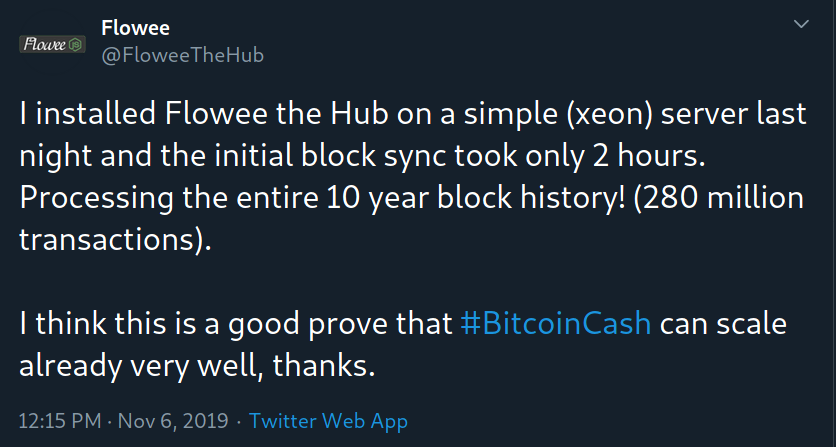Dec 20, 2019
I’ve been working in Bitcoin for quite some time now, with my first commit some 5½ years ago. After Gavin Andresen stepped down from Classic, and Bitcoin in general, I became the maintainer there. And a little over a year ago I started focusing on my own vision of what a so called “full node” should be.
Bitcoin is the most disruptive technology of this century. The way that our money works is largely unknown to most, and people just feel like they are getting poorer every decade. Bitcoin is actually really simple to understand as long as you don’t feel required to understand the crypto and the hashes. It is in fact much easier to explain Bitcoin to a passer by than it is the Euro or Dollar.
What excites me most is that Bitcoin Cash is unstoppable by governments. It is an idea whose time has come and the IMFs and the central banks of the world can’t stop it. At best they can slow down the adoption.
Adoption starts with people going to stores, and we see that today. Growth is real and is impressive. We see some small examples, like in Australia, where they actually managed to create a closed ecosystem of Bitcoin Cash. While this is very inspiriting, only time will tell if it can be duplicated elsewhere.
A parallel approach towards a Bitcoin Cash economy is to upgrade existing processes and software-applications to start supporting our coin. Think about paycheck handling, bookkeeping software and existing, integrated, point-of-sale systems. We have an entire world full of products that are in use and almost already do what we need. It makes sense to try and upgrade those tools instead of a rip-and-replace method which is going to be a hard sell to existing users.
Infrastructure
When you want to start a movement, and Bitcoin Cash is certainly that, giving people things like wallets and other finished products is great. But as the movement grows you want to focus on helping the people to create new tools instead. You want to make sure to support also the existing companies that ship those point of sale systems, or those bookkeeping products. And this is where infrastructure comes in.
In short, infrastructure is a set of products that allows new uses of Bitcoin Cash to be created much faster and with less problems. We use such products ourselves, for instance the Internet is infrastructure. But there is precariously little infrastructure in Bitcoin land.
I started Flowee with the goal to move the world towards a Bitcoin Cash economy. The method of reaching that goal is to create awesome products that people, and companies, can use to build on. And just as important, to allow users to improve their tools and as a result make them self-sufficient. This may be far future, but it matters to me. There are many free software products out there where most of the contributions come from people that are not the founders.
Having the software infrastructure built by the larger community of people all contributing to the tools they use is the only way we can scale this movement up. Infrastructure is just as much about people as it is about tools. People that build, and the things they build, together will help our movement stay sustainable and help new people get started faster.
Flowee is a family
A sentence anyone following Flowee will have seen before. Flowee is growing as the basics have been put into place in the first part of 2019.
We started 2019 with just Flowee the Hub. In March 2019 the big-block test app Flowee txVulcano got released. In April 2019 the first release of Flowee Indexer was made. In June 2019 a new indexer “spent-db” was added to the Indexer. In October the first release of Flowee Bitcore-proxy was made. In December the first release of FloweeJS happened.
In June we also put in the release notes that as a result of using the txVulcano on the Hub we managed to successfully mine and propagate blocks of 250MB in size.
As a result of great support in the community and some generous donations I started an internet server in November 2019. This was the first time I ran the Hub on professional server hardware. Which lead to this tweet;

We got some media coverage in November 2019: “Meet Flowee”.
Flowee the family has grown in 2019 from 1 product (the Hub) to 5.
FloweeJS
When Satoshi wrote the initial Bitcoin code he chose C++ for this. All our network rules are thus enshrined in C++ and this codebase will be for some time the de-facto standard. Flowee the Hub is a direct descendant from that same codebase that Satoshi started. Ensuring the maximum compatibility.
C++ is great for making well-scaling and really fast applications. But the language is not the most used. As such Flowee introduced the JavaScript based component for more programmers to build on top of the Flowee services.
Using the online APIs, more people can get started with FloweeJS fast and for free. Afraid of lock-in? No worry, the Flowee stack can be run on your own server or on some cloud service, with ease. And again, free of charge.
Future
I am very excited for what the future brings. Flowee has big plans and you can be part of it. All contributions are welcome! Translations of the website to your own language, some more JavaScript functions that people will want to use in projects or simply some shout-out to let people know we exist.
You can find out more about Flowee on the about page. Our code is on gitlab.
Happy winter holidays!